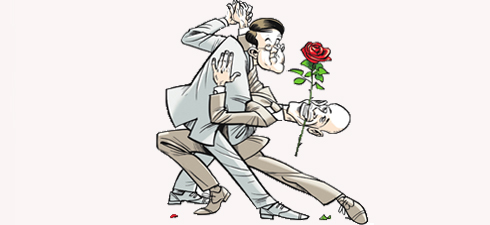Diplomats and EU officials in Brussels have already expressed their relief at the outcome of the recent general elections. “It’s fantastic the way the Netherlands has surpassed itself,” one of them admitted. “It has begun to see reason once more, with common sense prevailing in the end.” Another senior civil servant uttered: “It was also high time that the Netherlands started behaving normally again.”
Brussels’ fear that the sense of hate towards the EU would spread from the Netherlands – founder of the EU and triple A member state – throughout the rest of Europe, has been quelled for at least the time being. The expected coalition comprising VVD and PvdA is highly unlikely to turn its back on the EU. Since Diederik Samsom took the helm of the Dutch Labour party, it has resumed its traditional pro-European course after all.
The new coalition will have ample opportunity to clearly define its position within the Union during the months ahead. It is basically inevitable that the issue of whether Greece and Spain are to be bailed out once more using European funds will arise again in October or November.
Greater power to Brussels
Partly due to pressure placed upon them by Party for Freedom (PVV), Prime Minister Rutte and his Christian Democrat (CDA) Finance Minister De Jager have been watching the EU like hawks for the past two years, whenever it came to the matter of granting struggling member states emergency loans.
A coalition with PvdA is bound to change its tune towards Brussels. Its voting behaviour – one of critical assent – is unlikely to change much, given that the outgoing VVD/CDA cabinet already had to rely upon PvdA’s support to approve the emergency aid. A bigger turnaround is, however, expected in the plans of EU President Van Rompuy to completely restructure the EU
Prior to the elections, Mr Rutte sneered that he had “no interest whatsoever” in long-term European plans, particularly as these would go hand in hand with the sensitive issue of handing over greater power to Brussels. With Samsom at his side, however, Rutte will no longer be able to put paid to further discussion in such a definitive manner.
A more German attitude
Mr Van Rompuy and European Commission Chairman Barroso nevertheless consider further integration of EU member states inevitable, is they wish to retain their existing levels of prosperity and welfare. In practice, this implies the implementation of even more stringent European regulations with regard to budget discipline, far-reaching agreements on the economic and social policies to be pursued, further tax rationalisation measures, and a greater say for the European Parliament. As PvdA is in favour of such measures, Prime Minister Rutte will have to change his tune from a “No, never” to a “Yes, provided that…” when decision time arrives towards the end of the year.
A similarly flexible stance is also expected during the negotiation of the new EU multi-year budget. The “zero is plenty” attitude assumed by Messrs Rutte and De Jager (a budget freeze) is therefore bound to be replaced by a scenario which offers scope for modest EU budget growth. An outcome which is altogether more realistic, after all, unless the Netherlands were genuinely prepared to use its veto thwart budget agreements.
Mr Rutte therefore appears to have outlived his role as "Europe’s pain in the neck" which he was previously dubbed by EU diplomats. Instead of seeking to join forces with the Eurosceptics in London and Helsinki, a VVD/PvdA government would appear likely to assume a more traditional stance, which is closer to the critical yet constructive position taken in Berlin. Now that the elections are over, the Dutch Prime Minister appears to have assumed a more German attitude to Europe once more.
Opinion
Germans: A good example to follow
The "intensive public discussion" in Germany following the ruling by the Constitutional Court in Karlsruhe is an example the Dutch should follow because their attitude towards eventual attacks on democracy is "more nonchalant", writes Ton Nijhuis, the Director of the German Institute of Amsterdam University in De Volkskrant. Nijhuis says in the Dutch daily that —
The Netherlands would do better to take seriously the discontent and the concerns of the German people and to relieve them, as soon as possible, of their feeling of isolation, by, for example, taking seriously Angela Merkel's desire to achieve political union [...] We must clarify what we expect from Europe. If we take initiatives, rather than sitting on the sidelines complaining, we increase our chances of having a real influence [in Europe]. If we share the concerns of the Germans and if we conceive responses to them, we could try to avoid that Germany becomes discouraged, and at the same time we could drive and give direction to the debate on Europe within the Netherlands.
Was this article useful? If so we are delighted!
It is freely available because we believe that the right to free and independent information is essential for democracy. But this right is not guaranteed forever, and independence comes at a cost. We need your support in order to continue publishing independent, multilingual news for all Europeans.
Discover our subscription offers and their exclusive benefits and become a member of our community now!












